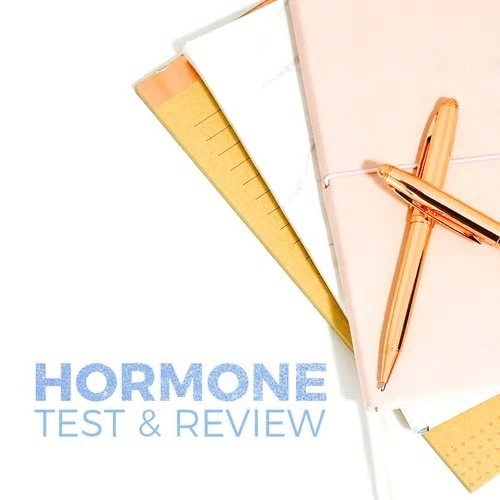Sleep, Your Hormones, and Best Sleep Hygiene
Hands down, sleep is the foundation of health.
If you’re one of the millions of Americans who suffer from insomnia, you know how truly debilitating it can be. Lack of sleep can leave you not only tired but irritable, depressed, anxious, excessively hungry and with endless cravings for carbs and sugar.
There’s no doubt about it, sleep is a foundation of health. While insomnia certainly effects both men and women, more women than men struggle with getting adequate, high quality sleep on a regular basis. Millions of prescriptions are written each year for sleep aids, and an ever-growing list of over-the-counter drugs are also readily available to combat sleeplessness.
A 2012 study by the Research Journal Obesity positively associates lack of sleep with being overweight. (1) Other symptoms commonly associated with sleep deprivation include depression, mood disorders, hormonal imbalances, weakened immunity, and greater risk of cardiovascular disease. (2)
On the flip side, getting enough sleep allows the body to regulate stress and other hormones, release human growth hormone, detoxify the brain, manage weight, control appetite, reduce your risk of heart disease, and more.
Many people don’t realize that insomnia is closely related to certain key hormones, and it’s in part for this reason that it can become a vicious cycle.
The Hormone-Insomnia Connection
The two primary hormone drivers of insomnia are cortisol levels that are high at night and melatonin levels that are low.
Low progesterone in women can also be a major player of something called cyclic insomnia, and these three hormones can be measured and their impact on insomnia understood in great detail with the DUTCH Test.
Cortisol and Your Sleep
As the body’s primary stress hormone, cortisol is released by the adrenal glands in response to stressful events. This is a completely natural phenomenon, as cortisol in healthy amounts and only in response to truly stressful situations is necessary for survival. When stress levels rise, the brain sends our adrenals the signal to produce more cortisol (as would be needed if we were running from a tiger, for example). Unfortunately, if this occurs chronically over time, insomnia and other physical symptoms can occur.
Sleep loss is a major stressor. Typically when we think about stress, we automatically think of mental and emotional stress. This is very real and impactful, but physical stressors such as insomnia are interpreted the same way by the body, meaning that the body will have an identical cortisol release no matter the type of stressor.
Melatonin and Your Sleep
Melatonin is referred to as “the sleep hormone,” and is produced in the pineal gland according to the natural contrast between sunlight during the day and darkness at night.
One simple strategy to support healthy melatonin production and release is exposing your body to morning daylight and getting as much time outdoors during the day as possible, and sleeping in complete darkness at night. Studies have solidly concluded that EMFs (electronic magnetic fields) can profoundly interfere with melatonin production, so it’s important to take simple measures to remove electronics from your sleeping space as much as possible. (3)
Cyclic Insomnia
Many women have experienced insomnia related to their menstrual cycle, often referred to as cyclic insomnia. Your luteal phase (the phase after ovulation and before your next period) has a natural surge and decline of both progesterone and estrogen. When hormones are balanced, this shift should not cause any significant symptoms, but when estrogen is high and progesterone is low, PMS symptoms and insomnia can greatly worsen. After the age of 35, progesterone levels tend to lower in all women, and low progesterone negatively impacts the production of melatonin. (4)
The DUTCH Complete test is an excellent tool that provides a detailed look at free cortisol values throughout the day, overnight melatonin production, progesterone levels and more to be able to effectively design a personalized protocol based on foods and supplementation for improved sleep.
Natural Sleep Aids
Mainstream medicine tends to jump immediately to over-the-counter or prescription sleep aids, many of which can be addictive and can cause unwanted side effects. Thankfully, there are many natural sleep aids that are far safer and just as effective in most cases.
Essential Oils
Your sense of smell can powerfully and directly impact how you feel, and smell — more so than the other senses — can best influence brain activity and a sense of calmness. Fascinating studies have found significant improvements in pain and depression after only one week of massage with the calming essential oils Bergamot, Frankincense and Lavender, and other specific oils excellent for lowering cortisol and supporting sleep include Cedarwood, Roman Chamomile, Vetiver and Ylang Ylang. (5)
Check out our article here for more information on the best essential oils for mood and sleep support. I love using essential oils for sleep on my wrists, mixed into a hot bath or on my pillows at night, and in a diffuser.
Sleep Maintenance
Sleep Maintenance is an aide that I absolutely love and highly recommend for sleep support. Its unique blend of amino acids, minerals, vitamins, botanicals and melatonin has proved to be extremely helpful for many clients I’ve worked with. This supplement boasts a safe and effective combination of calcium, magnesium, valerian, GABA, inositol, L-Theanine, 5-HTP, chamomile, hops, passionflower, skullcap, wild lettuce, jujube and melatonin.
For most people, taking 1-2 capsules 30-45 minutes before bed is recommended, but as with all supplements, working directly with your provider to determine the appropriate dosage is important.
Chelated Magnesium
Magnesium is a mineral that serves hundreds of important roles in the human body. It is a key mineral for sleep, stress, hormone balance and detoxification. Unfortunately, declining soil and food quality have created a situation where most people are somewhat deficient in magnesium.
I have tried many brands and forms of magnesium and have been blown away with the efficacy of powdered, chelated magnesium. Magnesium bisglycinate chelate is one of the best absorbed forms of magnesium, and should not cause any of the unpleasant gastrointestinal symptoms associated with magnesium supplementation due to the very stable chelate formed between two glycine molecules and each magnesium ion via a patented process.
Great food sources of magnesium include dark leafy greens, nuts and seeds, squash, broccoli and other vegetables, grass fed dairy, legumes, meat and dark chocolate.
Check out my article here for more information on magnesium, and why chelated magnesium in particular is so helpful as a natural sleep aid.
Cortisol Manager
As we talked about earlier, cortisol is the body’s primary stress hormone and is produced by the adrenal cortex in response to stressful events. When everything is functioning optimally, cortisol production is generally at its peak in the early hours of the morning and then gradually declines over the course of the day, preparing the body for sleep.
Cortisol Manager is a uniquely formulated supplement with stress-reducing ingredients and botanicals that promote relaxation and support healthy cortisol levels. Especially if chronic stress and elevated cortisol levels are at the root of your sleep struggles, this product can be extremely helpful.
If you’re someone who often finds yourself feeling tired but wired, honing in on balancing cortisol levels and output is essential.
Ayurvedic Sleep Tonic
One of my all-time favorite tonics is an Ayurvedic recipe for sleep that is relaxing, sleep-promoting and delicious. You can prepare this calming beverage by simply combining 1/2 cup warm, unsweetened almond milk and 1/2 teaspoon of nutmeg with a small amount of honey for sweetness, if desired. Sip this before going to bed, along with healthy sleep hygiene practices.
Five Proper Sleep Hygiene Practices
While natural sleep aids can be extremely beneficial, they should always be paired with sleep hygiene practices. Sometimes, these routines might seem like a challenging shift from your normal nighttime rituals, but once new habits are formed, they can make a world of difference in achieving the high quality sleep your body needs.
1) Avoid Blue Light
According to the National Sleep Foundation, blue light has a profoundly negative impact on the sleep of children and adults like. Research shows that the blue light emitted from common devices like smart phones, TVs and tablets can delay the release of melatonin and disturb the body’s natural circadian rhythm. Typically, melatonin is released in higher amounts during the two hours prior to sleep, and reaches its peak in the middle of the night. Blue light-emitting devices used during that timeframe from tablets, phones, TVs, computers and even fluorescent bulbs might be a recipe for less or poor quality sleep, so aim to turn off these devices one to two hours before bed.
In the case of having to use them, be sure to use your devices blue light “night light” settings to minimize its impact.
2) Get to Bed by 10 PM
For the night owls out there, this might be a hard pill to swallow, but not impossible to implement with some practice and understanding of why a 10 PM curfew is important for those who struggle with sleep.
There is an old saying that every hour of sleep before midnight is worth two hours. This could be because we produce more human growth hormone when we sleep when it turns dark, instead of staying up later. (6) Many people find that if they stay up past 10pm, they get a second wind of sorts, and this is usually a sign that your circadian and cortisol rhythms are off. To get them both back on track, take measures that help you settle down for bed earlier, such as avoiding sugar and alcohol at night, ending screen time by 8pm and a relaxing epsom salt bath for sleep.
Here are five fun ways to fix your adrenal glands (going to bed at 10 pm being one way) in order to feel better and support sleep.
3) Take an Epsom Salt Bath
An epsom salt bath is a wonderful way to absorb magnesium and improve sleep. Soaking for 20-30 minutes with 3-4 cups of Epsom salts in a hot bath can be exactly the break you need.
Read more here about the incredible benefits Epsom salt baths can provide. As a quick recap, Epsom salts can help with everything from improving the communication of your brain’s neurotransmitters to supporting digestive function to improving sleep, anxiety and high stress levels.
4) Use an Eye Mask and Blackout Curtains
Remember that optimal melatonin production and release at night depends on darkness. The more measures you can take to create a completely dark atmosphere during sleep, the better. Blackout curtains are a fantastic way to ensure a darker room and less morning light disturbance, and an eye mask can be a close second. Choose blackout curtains that do not have a stinky, chemical-based backside!
Use both or just one, depending on what feels best and most natural for your body. An eye mask is a great travel sleep support to have on hand.
5) Practice Meditation
Anxiety and an inability to turn off ruminating thoughts at night is a major cause of sleep disturbances. Research shows that mindfulness meditation can help with insomnia, and you don’t need to carve out a huge amount of time to reap the benefits. (7) Like every form of self care, find what resonates with you and works for your lifestyle, whether that be 20 minutes of seated meditation before bed, or just five minutes of deep breathing. I love the free app insight timer for a huge library of guided sleep meditations that support relaxation.
With a combination of proper lab testing for underlying causes of insomnia, targeted and personalized supplementation and healthy sleep hygiene, you exponentially increase your chances of getting a good night sleep and feeling your best day in and day out.
Hormone-Supportive Resources
Hormone Care Kit
The first is our Hormone Care Kit, a daily dose of high-quality:
Magnesium
Fish oil
Multivitamin
That will give you the micronutrients you need to build and balance hormones at any age. The kit delivers a one-month supply.
DUTCH Complete Hormone Test
Our most popular test is suitable for all adult women and men. It’s an easy, at-home, one-day test that will give you a clear picture of your hormonal status.
It tests for:
Estrogen
Testosterone
Progesterone
DHEA
Cortisol
Melatonin
Some vitamin markers
Some neurotransmitters
Oxidative stress markers
Plus a private consultation with our functional health coaching team to help you understand your results and make your best plan.
‘Big Three’ Testing Package
Also featured is our ‘Big Three’ testing package, which includes our three most popular functional tests to provide a clear snapshot of how your body is working overall:
the DUTCH test
the GI-MAP test (digestion)
a complete thyroid panel
This package also includes a long private session (an hour and a half) with your functional coach to go over all the results and make a customized plan for your needs.
Bridgit Danner, LAc, FDNP, is trained in functional health coaching and has worked with thousands of women over her career since 2004. She is the founder of Women’s Wellness Collaborative llc and HormoneDetoxShop.com.
Check our her easy 5-Day DIY Detox Guide here!


![Sleep-Maintenance-3D__53068.1612773919[1].png](https://images.squarespace-cdn.com/content/v1/53b1df7ee4b0dc3e7be6bb86/1613502604064-E6YTLX3KRDCXVPJPGCGC/Sleep-Maintenance-3D__53068.1612773919%5B1%5D.png)















Of all of the symptoms that women experience with their menstrual cycles, menstrual migraines are among the most debilitating. Read on to learn what they are and how to avoid them.